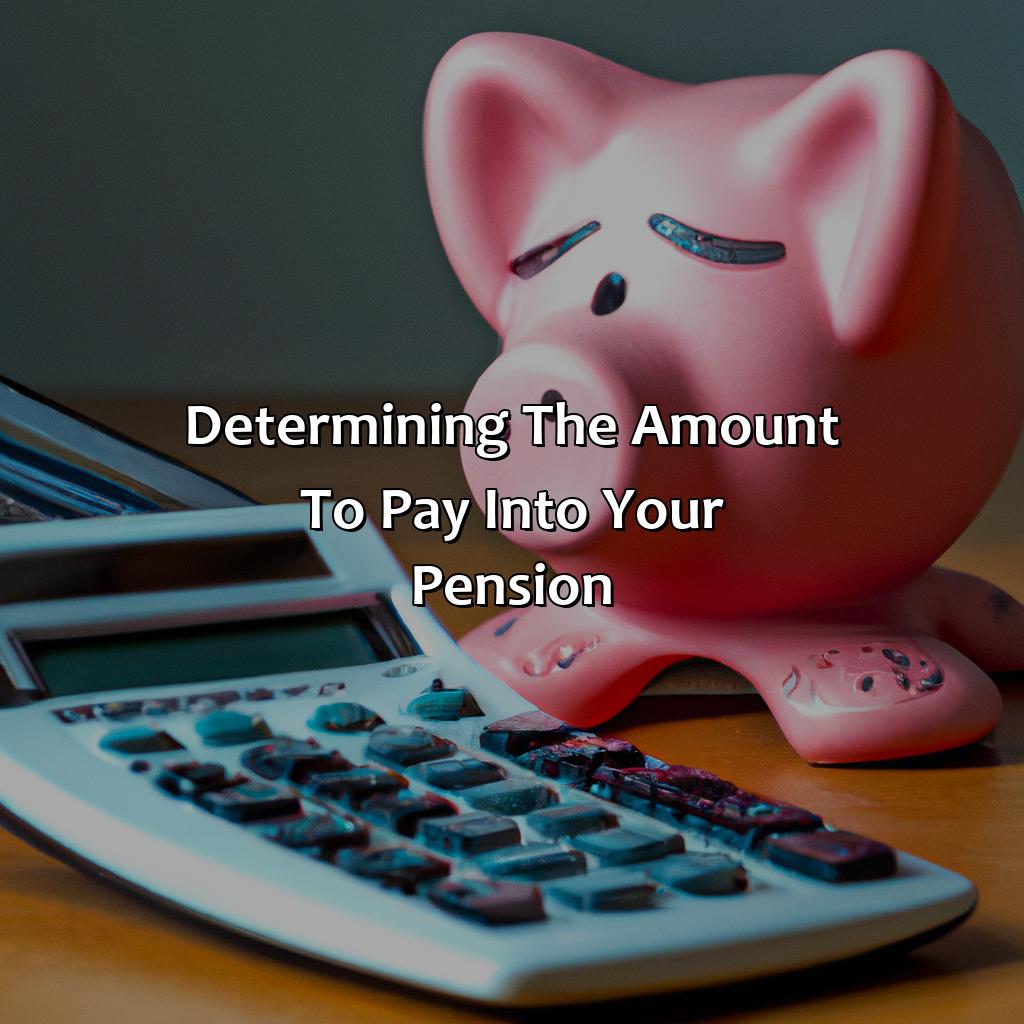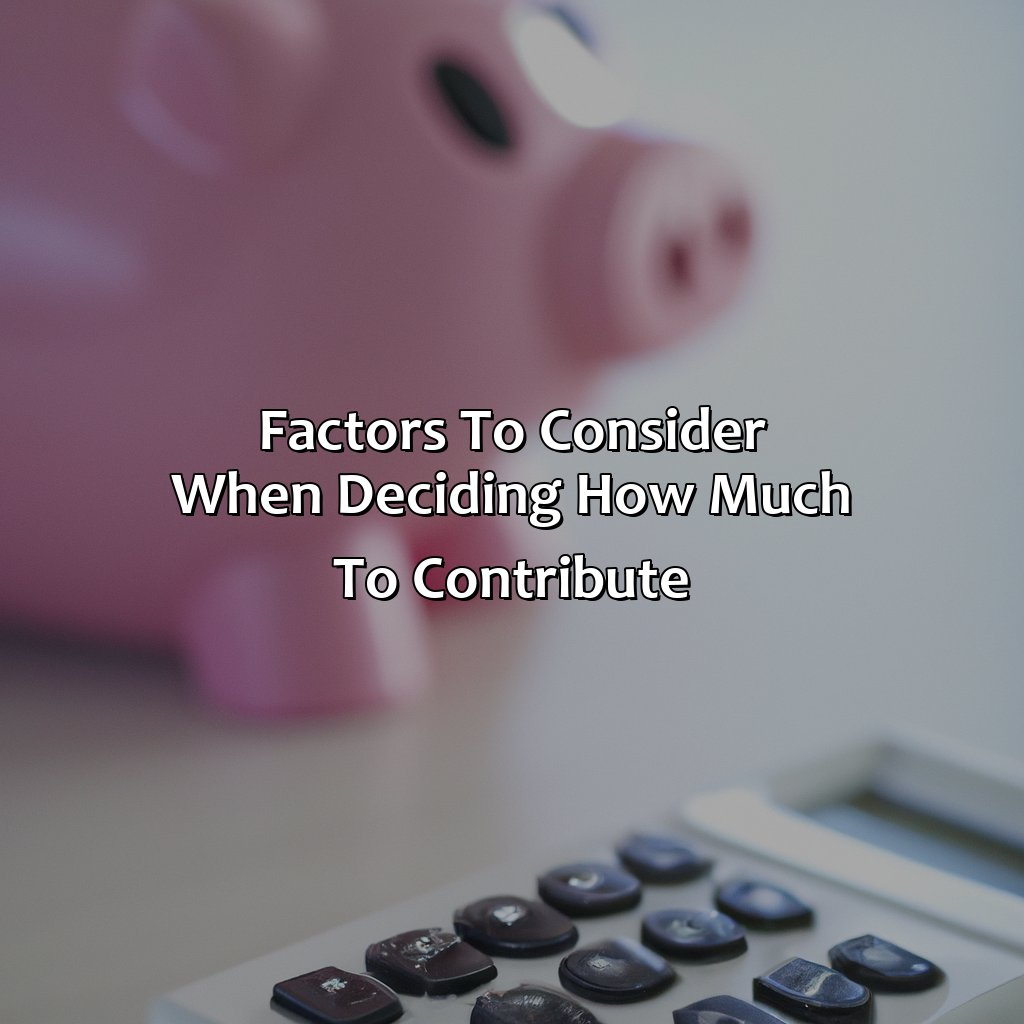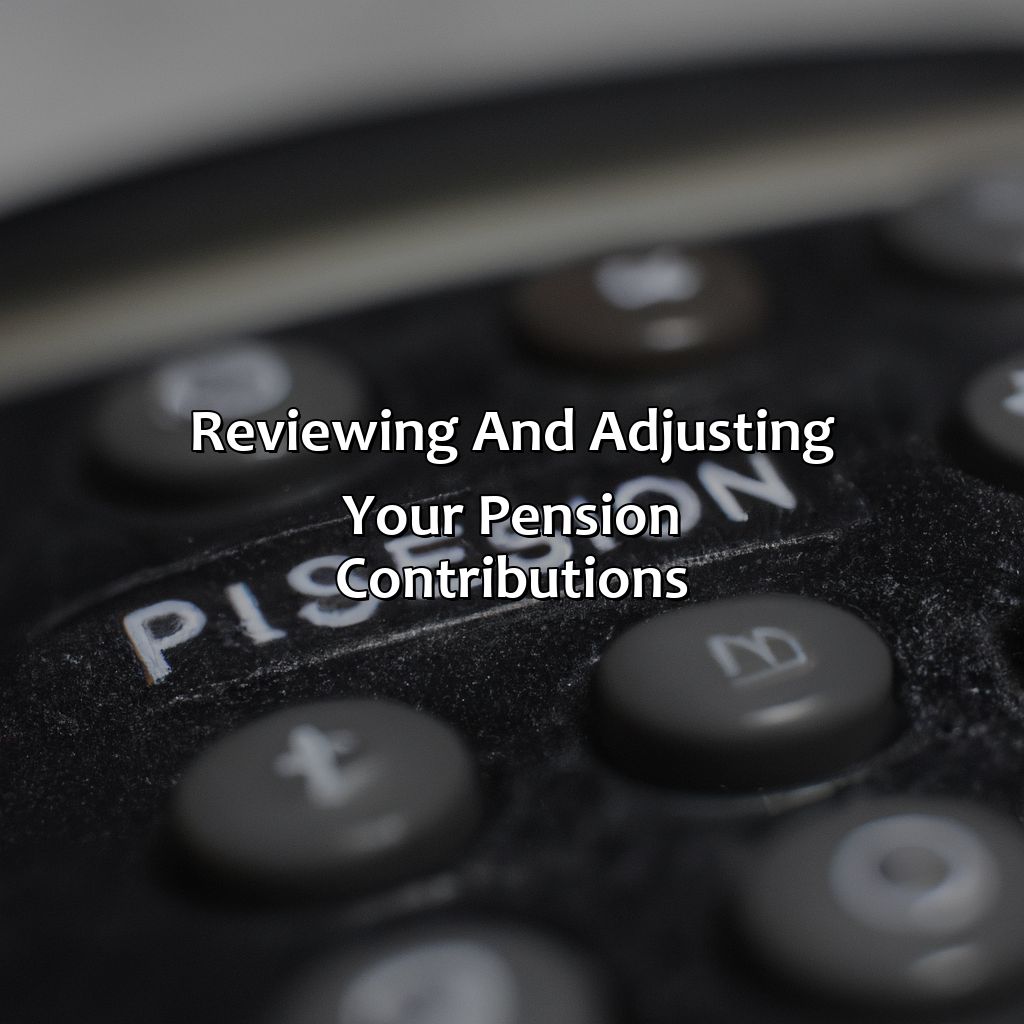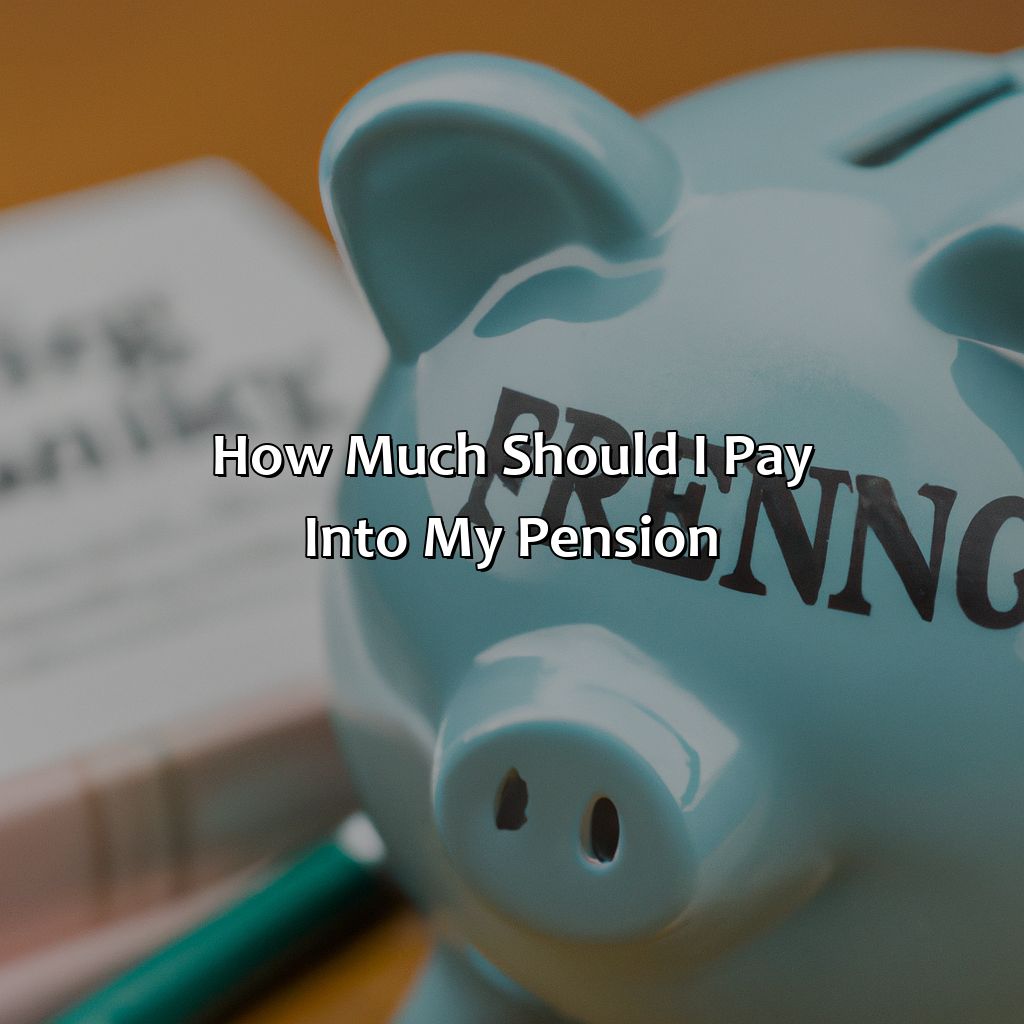How Much Should I Pay Into My Pension?
Key Takeaway:
- Calculating the amount to pay into your pension depends on factors such as your age, income, and retirement goals. It is important to evaluate your financial needs and seek advice if necessary to determine a suitable contribution amount.
- Understanding your pension scheme and its types is crucial in determining your pension contributions. Additionally, considering automatic enrollment and employer contributions can significantly impact your pension fund.
- Prioritizing saving for your pension while balancing other financial goals is important. It is possible to adjust your pension contributions over time, so reviewing and making changes to your contributions is necessary to ensure long-term financial stability.
Are you unsure how much to pay into your pension? You need to make sure you’re putting away enough to secure a comfortable retirement. This article will help you understand how much you should be paying into your pension.
Determining the Amount to Pay Into Your Pension
Determining the optimal amount to pay into your pension requires careful planning and consideration of several factors. To ensure you are financially secure in your retirement years, follow these four essential steps:
- Assess Your Retirement Needs: Begin by estimating your post-retirement expenses, including basic living costs and any discretionary spending. Consider variables like inflation, potential healthcare expenses, and expected longevity. Be realistic, and take your individual circumstances into account.
- Evaluate Your Current Savings: Calculate how much you’ve saved so far, including any employer contributions or the state pension. Based on your retirement needs, determine if your current savings are enough to provide the income you require. If not, you may need to increase your contribution rate.
- Look at Your Future Earnings: Calculate your future earnings, including any pay raises, bonuses, and other income sources. Consider whether you anticipate a change in lifestyle or increase in income in the future, and adjust your contribution rate accordingly.
- Choose the Right Pension Plan: Select a pension plan that aligns with your retirement goals and risk tolerance. Ensure that you are contributing the maximum amount allowable under the chosen plan, if possible.
Do not forget to reassess your retirement plan regularly to account for changes in circumstances and adjust your contribution rate accordingly.
In addition, remember that delaying contributions only makes it more difficult to reach your retirement goals. Take action now to avoid regrets later in life.
It’s crucial to plan for your retirement carefully. Don’t miss out on the opportunity to secure your financial future. Start planning today.

Image credits: retiregenz.com by David Woodhock
Understanding Your Pension Scheme
Gaining insight into your pension plan is key to ensuring a comfortable retirement. You need to explore the different types of pension schemes available and also understand how your contributions are calculated. To get a better hold of the situation, delve into the sub-sections:
- Types of Pension Schemes
- Calculating Your Pension Contributions

Image credits: retiregenz.com by Joel Woodhock
Types of Pension Schemes
There are various classifications of retirement schemes available for individuals to contribute to during their working years. A careful pension plan must be chosen in order to attain a comfortable post-retirement life. Here’s a breakdown of potential infrastructures offered to select from:
In the following table, we have listed different types of pension plans with some basic information concerning each type:
| Type of Pension Scheme | Characteristics |
|---|---|
| Defined Benefit Plan | Based on employee’s earning history and tenure. It provides a definite income following retirement. |
| Defined Contribution Plan | Contributions are usually made by the individual, and matching employer contribution may be possible. The sum generated is based on the total contributions made over time, as well as investment performance. |
| Cash Balance Plans | A numerical pay scale or percentage based on average yearly salary for a certain number of years is credited as lump-sum until retirement |
| Individual Retirement Arrangements (IRA) | Individuals set aside funds for future use that aren’t taxed until withdrawn from an IRA account |
It’s essential to take notice of particular regulations and terms as specific pensions depend on the employer, income level, etc.
One suggestion would be committing at least 15% of pre-tax income towards pension plans every year. Another approach could be maintaining an emergency fund in case any eventualities occur and reduce contributions temporarily till things stabilize again. If you’re specifically looking for information on how much a police pension is, it’s important to check with your local police department for specifics.
Both options set oneself up towards financial security post-retirement life and lead stress-free golden years ahead.
Get ready to break out the calculator, because figuring out your pension contributions is about to make algebra class seem like a walk in the park.
Calculating Your Pension Contributions
When it comes to contributing to your pension scheme, it is important to know how much you should be putting in. Understanding this calculation can help you prepare for a financially secure retirement.
Here’s a simple 3-step guide on how to calculate your pension contributions:
- Start by checking your pension scheme documents and finding out the contribution rates set by your employer.
- Calculate the percentage of your salary that you need to pay each month into your pension scheme according to the rates set by your employer.
- Multiply this percentage figure with the amount you earn monthly. This will give you the amount of money that needs to be deducted from your salary for pension contributions.
It’s worth noting that some schemes have different contribution rates depending on age or number of years worked, so make sure to check how much SSS pension you will get based on your situation.
When calculating your pension contributions, it’s important to not forget any other pension pots or investments you may have. The more money you contribute, the more secure your financial future during retirement may be.
A well-known example of why calculating pension contributions is important is seen with many retirees who received lower benefits than they expected due to not enough money being contributed towards their pensions during their working lives. Don’t let this happen to you – start planning and calculating today for a comfortable future! Find out how much pension credit you could receive per week to help with your retirement planning.
Deciding how much to contribute to your pension scheme is like choosing between avocado toast or ramen noodles for lunch – one may be more tempting now, but the other will give you a more satisfying and secure future.
Factors to Consider When Deciding How Much to Contribute
Determining how much you should pay into your pension requires consideration of various factors. Age, income, and retirement goals are three major factors that determine your contribution. Automatic enrolment and employer contributions can also have an effect. Furthermore, you need to manage saving for other financial targets while simultaneously contributing to your pension.

Image credits: retiregenz.com by Harry Duncun
Age, Income, and Retirement Goals
When determining how much to contribute towards your retirement, several factors come into play. One must consider their current age, earnings, and future ambitions for retirement.
The following table displays the correlation between age, income, and retirement goals:
| Age | Income | Retirement Goal |
|---|---|---|
| 20-30 | $30,000-$50,000 | Early Retirement |
| 30-40 | $50,000-$75,000 | Comfortable Retirement |
| 40-50 | $75,000-$100,000+ | Late Retirement |
It is crucial to note that these figures are just an estimate and do not apply to everyone. Factors such as debt repayment or unexpected expenses may affect one’s ability to contribute more towards retirement. Moreover, it’s essential to remember the power of compound interest when deciding how much to save. Even small contributions early on in life can grow significantly over time.
To ensure a stable future during retirement years ahead, here are three suggestions:
- Start contributing early – the earlier you begin saving for retirement, the better chance you have at achieving your desired goal.
- Increase your contribution percentage over time – as earning potential increases or debts decrease consider raising the percentage contributed towards overall savings.
- Seek professional guidance – consulting with financial advisors or planners can help facilitate a budget based on individual needs and circumstances.
Employer contributions to your pension are like a boss giving you a raise, except it’s your future self who’s really cashing in.
Automatic Enrolment and Employer Contributions
When it comes to retirement planning, automatic enrolment and employer contributions play significant roles. Employers are legally required to enrol eligible staff members into a pension scheme, which includes contributions from both employees and employers. This ensures employees have access to a savings plan for their future retirement.
To make the most of this scheme, employees should take advantage of any employer contributions available. Failure to do so could result in missing out on benefits that would significantly boost their retirement savings. If you’re wondering how much is an average pension, it’s important to note that the amount varies depending on several factors, including the individual’s income and years of service.
In addition, it is important to carefully consider how much to contribute personally towards the pension scheme. Factors such as personal financial goals, lifestyle expectations, current debts and expenses all come into play when deciding on a contribution amount. If you’re wondering how long does a pension last, it ultimately depends on various factors such as the amount contributed and the type of pension plan chosen.
Fear of not having enough saved for retirement can be concerning. Therefore, it’s crucial to assess your individual needs and make decisions based on those factors rather than just following norms or advice from others.
Save for the future, but don’t forget to live a little now – unless your idea of living is just eating ramen noodles every night.
Balancing Saving for Other Financial Goals
When deciding on pension contributions, it’s important to consider balancing other financial goals such as saving for a down payment on a home or paying off debt. Evaluating current income and expenses can help determine how much to contribute. It’s crucial to weigh the long-term benefits of contributing more towards retirement versus meeting other financial needs in the short term.
Additionally, individuals should consider their age and proximity to retirement when deciding on contribution amounts. Those with more years until retirement may be able to afford higher contributions while those closer may need to prioritize other financial obligations. If you’re wondering how many years you have to work in Canada to get a pension, click the link to know more.
A client once struggled with finding the right balance between contributing towards retirement and investing in their business. By carefully analyzing their finances and weighing the potential long-term benefits, we were able to create a plan that not only met their immediate needs but also helped them stay on track for a comfortable retirement.
Why leave your future in the hands of fate when you can adjust your pension contributions and take control?
Reviewing and Adjusting Your Pension Contributions
You need to monitor your pension regularly to adjust contributions effectively. To review, you have to make changes. Here’s two sub-sections to better understand:
- How to monitor your pension: Keep track of your pension contributions and their performance. Make sure to review your pension fund’s annual statement and take note of how well your money is doing.
- How to change contributions: If you find that your current contributions are not meeting your retirement goals, consider increasing them. You can speak to your employer or pension provider to make the necessary changes.

Image credits: retiregenz.com by Adam Woodhock
Regularly Monitor Your Pension
Regularly checking on your pension contributions is imperative to safeguard your financial future. Here are five points to consider when monitoring your pension:
- Keep track of contributions and ensure they align with your retirement goals.
- Review investment options and make necessary changes.
- Stay updated with plan fees and charges.
- Consider increasing contributions as you approach retirement age.
- Take advantage of any employer matching contributions.
It’s also important to check beneficiaries regularly, update contact information, and review life events that may impact your pension plan. Remember the importance of regular monitoring for a successful retirement.
Efficient monitoring can prevent unforeseen problems. For instance, a businessman, Bob, wanted to retire at 55. However, he only realised at 53 that his assets would not be sufficient due to irregular checks on his pension contributions over the years. Bob had to delay his retirement plans until he turned 60 after making additional contributions in the remaining years before retirement age. To avoid such situations, it is important to know how much Canada pension plan you will receive and how much you should pay into your pension to meet your retirement goals.
Adjusting your pension contributions is like going to the gym – painful at first, but you’ll thank yourself in the long run.
Making Changes to Your Contributions
Adjusting your Pension Contributions: Tips & Tricks
When modifying your pension contributions, ensure to weigh the value of money you want to receive after your retirement against the amount you contribute. Avoid increasing the contributions too much or declining the sum too soon. A reasonable idea is to contribute a realistic percentage of your annual income, generally ranging between 10-15 percent. Wondering about average pension for a nurse? Check out this article.
It’s essential to audit and reassess your financial goals when changing your pension contribution amounts. Evaluate how long you have until retirement and decide on whether you should consider increasing or decreasing payments. Keep in mind, current economic conditions and tax lay-outs when altering payments. Check out how much pension is in the UK to help you make informed decisions.
Calculating proper customization for individuals can cause confusion, but many tools and consultants such as managed funds can help identify opportunities for adjustments to increase retirement savings or consolidated finances.
A female online business owner made adjustments according to her fluctuating salary while prioritizing investments using automated services. The settled revenues helped met demographic time thresholds at a younger age while providing more financial security after retirement. If you’re wondering how much a widows pension is, it’s important to plan and save for retirement early on.
Five Facts About How Much You Should Pay Into Your Pension:
- ✅ You should aim to save at least 15% of your income for retirement. (Source: The Balance)
- ✅ Some experts suggest saving 20% or more of your income for retirement. (Source: CNBC)
- ✅ Starting early and consistently contributing to your pension can significantly increase your retirement savings. (Source: Investopedia)
- ✅ Making additional contributions, such as through employer matching programs or catch-up contributions, can also boost your pension savings. (Source: Forbes)
- ✅ Factors such as your retirement goals, lifestyle expectations, and life expectancy should also be considered when determining how much to save for your pension. (Source: The Motley Fool)
FAQs about How Much Should I Pay Into My Pension?
How much should I pay into my pension?
The amount you should pay into your pension will depend on various factors, including your age, retirement goals, income, and current pension contributions. The general rule of thumb is that you should aim to save at least 15% of your pre-tax income for retirement. However, it is advisable to use a pension calculator to determine the specific amount you should contribute to meet your retirement goals.
What happens if I don’t pay enough into my pension?
If you don’t pay enough into your pension, you may not have enough to sustain your desired lifestyle in retirement. You may be eligible for certain state benefits, but these may not be enough to meet your financial needs. It is essential to contribute regularly and monitor your pension to ensure that you are on track to achieve your retirement goals.
Can I increase or decrease my pension contributions?
Yes, most pension schemes allow you to increase or decrease your contributions. You can usually do so by contacting your pension provider or through your employer’s payroll department. It is essential to consider the impact of any changes on your retirement goals and make adjustments accordingly.
What is the maximum amount I can pay into my pension?
The annual allowance for pension contributions is currently set at 40,000, but this may be lower for high earners. If you exceed your annual allowance, you may be subject to tax charges. However, you may be able to carry forward any unused allowance from the previous three years.
Can I pay into more than one pension scheme?
Yes, you can pay into more than one pension scheme. However, you will need to ensure that your total contributions do not exceed your annual allowance. It is also essential to consider how contributions to multiple pensions will affect your retirement goals.
When should I review my pension contributions?
You should review your pension contributions regularly, ideally at least annually, to ensure that you are on track to meet your retirement goals. You may need to consider changing your contributions if there are changes to your income, employment status, or retirement plans. It is also essential to check the performance of your pension investments to ensure that they are meeting your expectations.


